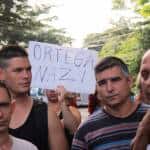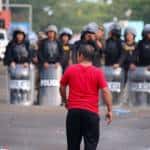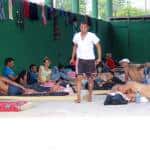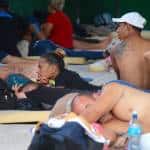PEÑAS BLANCAS, Guanacaste – When he began the long journey north from Ecuador, Dr. Henry Roque wore a brand-name watch, carried a suitcase full of clothing and had a hat to protect him from the sun. Twenty-two days later, the only possessions he has are the clothes on his back and a Cuban passport.
Despite being a practicing cardiologist, Roque said he earned only $20 a month back in Cuba, which wasn’t enough to afford basic goods for his family. So he decided to send his wife and two children – ages 5 and 7 – to the United States first, along with a group of other family members. Roque would follow later, according to the plan, via a land route stretching thousands of kilometers from South America, through Central America and Mexico, and then on to the U.S.
“They’ve been waiting for me for a month in Miami,” Roque said of his family in the U.S. “First I was greeted with the Costa Rican reality in Paso Canoas [Costa Rica’s border with Panama], and now Nicaragua refuses to let us pass, even assaulting us with its army.”
Roque spoke with The Tico Times while resting on a bench at immigration offices in Peñas Blancas, a dusty, hot town at Costa Rica’s border with Nicaragua, some 300 kilometers northwest of the capital, San José.
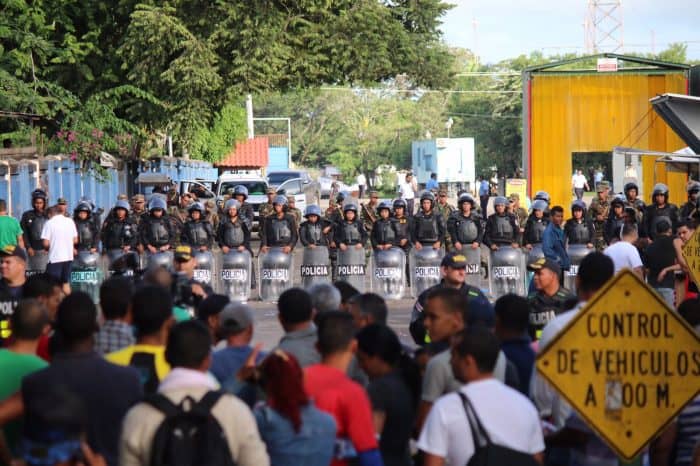
‘My daughter nearly died’
On Sunday, Cuban migrant Suartey Ébora lived moments of terror. Ébora had just crossed from Costa Rica into Nicaraguan territory with 1,600 others when they were attacked by the Nicaraguan army and anti-riot police.
“They didn’t ask us anything. They made us all sit down in the street, and out of nowhere they began firing tear gas and rubber bullets. Several people were injured,” Ébora said.
A tear-gas canister exploded next to the face of Ébora’s 1-year-old daughter, Lindsay, injuring her lip. The child had trouble breathing, and the gas burned her skin.
“She almost died,” Ébora said.
See: Cuban migrants caught in limbo again as Nicaragua sends them back to Costa Rica
“We ran back to Costa Rican territory, and here we’re being treated as refugees,” Ébora said.
Red Cross spokesman Gerald Jiménez told The Tico Times that 30 Cubans were treated for exposure to tear gas and alleged beatings from the Nicaraguan military.
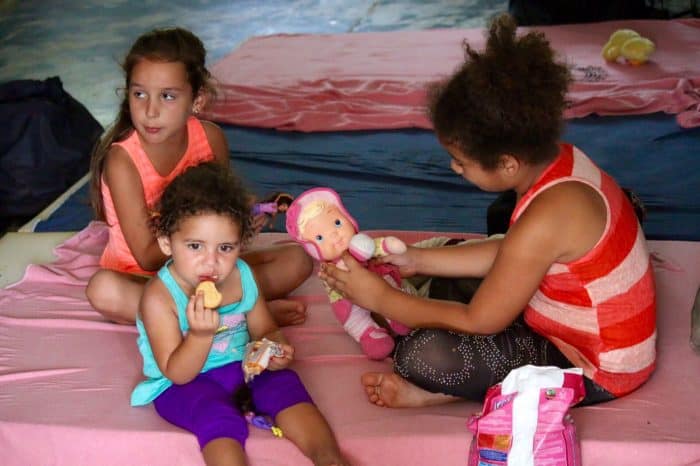
Currently, some 2,500 Cuban migrants are in Costa Rica after the government issued most of them seven-day transit visas over the weekend. But Nicaragua’s refusal to allow Cubans to cross into Nicaraguan territory has created a bottleneck, and Costa Rican authorities warn that hundreds — if not thousands — more could be on their way from Ecuador.
Since Sunday’s events, Costa Rica has set up two shelters in the border canton of La Cruz, attended by emergency personnel including the Red Cross and the National Emergency Commission, or CNE. The shelters can house up to 450 migrants, but the actual number of Cubans at the border far exceeds this capacity.
Others have remained in Peñas Blancas, sleeping on the floor at immigration offices or in hotel rooms for those who still have access to cash.
The CNE reported that roughly 800 Cubans are at the border crossing as of late Monday afternoon.
Nicaragua, meanwhile, has temporarily closed its land border with Costa Rica, maintaining a heavy presence of anti-riot police and heavily armed soldiers.
CNE personnel have been coordinating Costa Rica’s response with firefighters, municipal emergency commissions, the U.N. High Commission on Refugees and the International Organization for Migration.
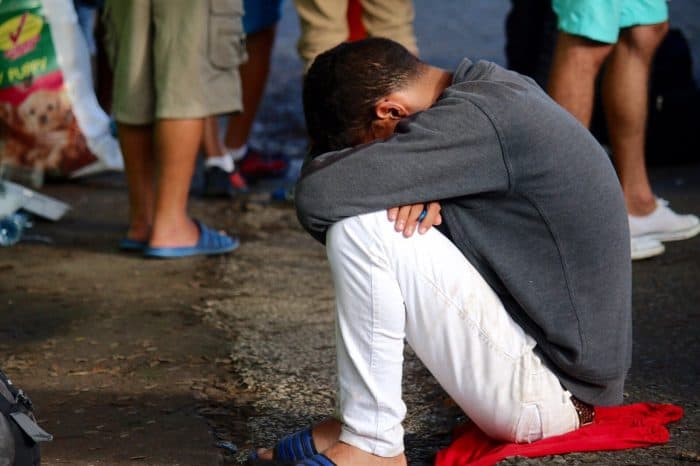
US: No changes planned for ‘wet-foot, dry foot’ policy
In Havana, the U.S. Embassy tweeted: “Concerned about the situation of Cuban emigrants trying to travel to the USA though Central America.”
Preocupados por la situación de los emigrantes cubanos que tratan de viajar a #EEUU por #Centroamérica.
— Embajada de los Estados Unidos en Cuba (@USEmbCuba) November 16, 2015
“We insist that the countries of Central America respect the rights of emigrants and ensure that they are treated humanely,” read another tweet from the embassy.
Instamos a los países de #Centroamérica a respetar los derechos de los emigrantes y asegurar que exista un tratamiento humanitario
— Embajada de los Estados Unidos en Cuba (@USEmbCuba) November 16, 2015
A spokeswoman for the U.S. Embassy in San José told The Tico Times in an email that embassy observers were at the border.
“Safe, legal, and orderly migration also remains a priority of the United States. The Obama Administration has no plans to alter current migration policy toward Cuba and Cubans, including the Cuban Adjustment Act,” an embassy statement added.
On Monday, ahead of a meeting with Costa Rican officials and lawmakers at Casa Presidencial in San José, Foreign Minister Manuel González said, “We can’t look the other way as if there wasn’t a problem here.”
Later, at a news conference, González said, “We had warned that this could happen. … It’s not that this problem suddenly arose and now we’re taking action. The existence of this problem has been made visible in the clearest terms after the dismantling of a human smuggling network last week.”
The foreign minister added that Costa Rica so far has issued 1,790 seven-day visas to help normalize the legal status of those migrants. A long-term solution, however, appears nowhere in sight.
Related: ‘Dusty-foot’ Cubans forgo rafts, choose land route through Costa Rica
See more photos of the Cuban migrant crisis at the Costa Rica-Nicaragua border:


